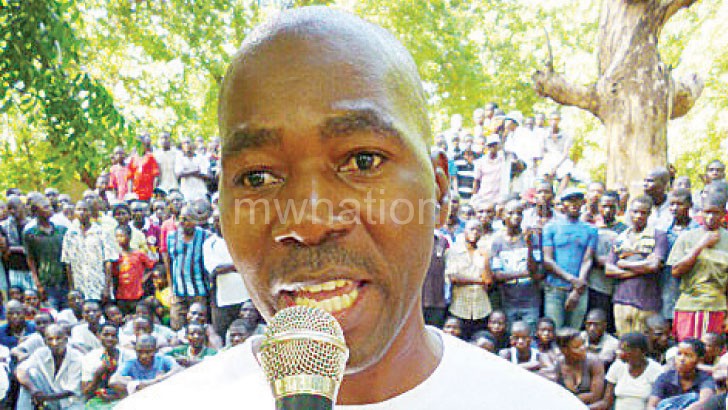Confronting the culture of passive citizenship
Wearing a queer and dejected face, 47-year-old Fidelis Mukumbwa pulled over a stool and sat at one of the watering holes at Nsanje Boma.
It was not a strange phenomenon. Mukumbwa spends most of his leisure time at this place. He is known to fellow imbibers as a jovial, jolly and honest fellow. He is always full of life when he patronises a bar of his choice.
But this was not the case when Mukumbwa arrived at this place on the day. This time, he looked queer and dejected—seemingly not ready even to exchange a greeting when he took his seat.
“I do not know what is wrong with this country. Twenty-two years ago, we, Malawians, demonised and showed the one-party system of government the exit door for, among others reason, its failure to respect our rights,” Mukumbwa said, digging into what was taking away his happiness.

“Inspired by the pastoral letter issued by the Catholic bishops, we demonstrated against the system’s rigid censorship of mass media, infringement on education, and frequent illegal imprisonment of hundreds of innocent Malawians, and so many other things.”
Mukumbwa paused to take a sip from what has now become his favourite brand, Chibuku Super.
He said he was getting worried that what the Catholic bishops and well-meaning Malawians prayed and fought for has failed to bear the much-anticipated fruits.
Mukumbwa disclosed that he expected that, by now, Malawians should have been active in voicing out their concerns on matters that have direct impact on their lives. He said he expected Malawians to be more active in demanding responses from leaders when things go wrong.
“Today, those bishops could be the last people to have led the fight for democracy because, it would seem, it was imposed on Malawians. I believe the bishops expected active citizenship from Malawians, but we have refused to assume it 22 years after the referendum.
“Through our passive citizenship, we have persistently refused to participate in the running of social, economic and political activities of our country. We are dead quiet as leaders are busy formulating and imposing bad and oppressive laws on us,” Mukumbwa said.
Mukumbwa’s analysis of the political situation in the country is something that did not come just like that. Like a number of others, he has had his mind opened up because of programmes the National Initiative for Civic Education (Nice) Trust is implementing.
Nice Trust Nsanje district civic education officer Kondwani Malunga defines active citizenship as a combination of knowledge, attitude, skills and actions that aim to contribute to building and maintaining a democratic society.
He says the major objective of active citizenship is to support democratic cooperation that is based on the acceptance of universal human rights and the rule of law, values diversity and includes the whole community.
But the civic educator notes that this can be achieved when citizens have the right to information on developments taking place in their areas while service providers as well as duty-bearers are tasked to provide that information in the spirit of transparency and accountability.
“The media has reported on cases where politicians, particularly MPs [members of Parliament] and councillors, are interfering in the implementation of these development projects by pressing district technical staff to divert funds towards projects that would help them gain political mileage.
“And if citizens are not equipped with skills and information to enable them assume active citizenship, the very leaders we entrusted with responsibility to run the affairs of our nation can be threats to the tenets of democracy,” he warns.
Malunga said Nice and other organisations are currently creating awareness on the need for Malawians to assume active citizenship.
He said this initiative has seen citizens, through their area development committees (ADCs) and village development committees (VDCs), tracking and demanding transparency and accountability in the implementation of development projects, including those under Constituency Development Fund (CDF) and Local Development Fund (LDF).
“Using these structures, people are now questioning and demanding high levels of transparency and accountability from both elected and appointed duty-bearers.
“This is not only an indicator that the ADC members are becoming knowledgeable about their roles and responsibilities, but also effective citizen participation in the decision-making processes, monitoring resource allocation and utilisation,” he says.
Nsanje assistant community development officer Tobby Chitengu says building the capacity of ADCs and VDCs is critical to the democratisation process as this helps people at the grass roots to know, participate and track development activities taking place in their respective areas.
And to experiment their authority after undergoing a series of capacity building trainings by Nice, Nsanje ADC members have started engaging their elected and appointed leaders to come up with measures that can best help their areas transform. n





